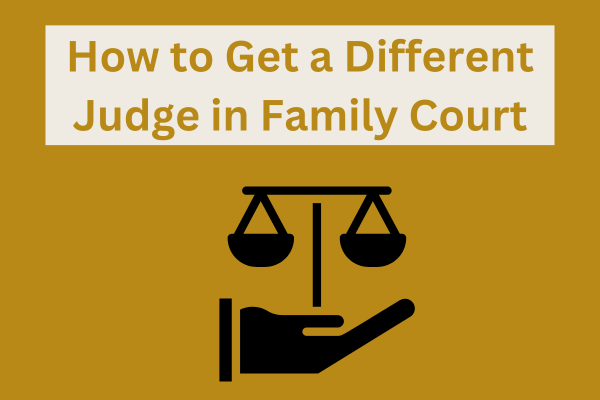Title: How to Get a Different Judge in Family Court: A Comprehensive Guide
Introduction: The family court system serves as a critical platform for addressing sensitive and intricate matters within families. However, there are instances where parties involved may find themselves facing concerns about the judge presiding over their case. Whether driven by perceived bias, prior unfavorable experiences, or a genuine need for impartiality, the option to request a different judge becomes a topic worth exploring. In this blog post, we will delve into the process of requesting a different judge in family court cases.
Understanding the Need for a Different Judge: The decision to seek a different judge isn’t taken lightly. Parties may consider this option for various reasons, each tied to the overarching goal of ensuring a fair and just trial. Some of the common reasons include:
- Perceived Bias: Parties might believe that the current judge exhibits bias or prejudice that could hinder an impartial resolution.
- Conflicts of Interest: If there are circumstances suggesting a judge’s connection to any of the parties involved, it could raise concerns about their neutrality.
- Fair Trial Assurance: In certain cases, parties might have previously faced unfavorable rulings from the same judge, leading them to seek an alternative for a fresh perspective.
The Process of Requesting a Different Judge: The process for requesting a different judge varies based on jurisdiction and legal regulations. Generally, it involves the following steps:
- Consulting an Attorney: Engaging a knowledgeable family law attorney is the first step. They can guide you through the legal nuances and help craft a compelling case for a different judge.
- Gathering Evidence: It’s crucial to gather concrete evidence that substantiates your concerns about the current judge’s impartiality or possible conflicts of interest.
- Filing a Motion: Your attorney will assist you in filing a formal motion with the court. This motion outlines the reasons for requesting a different judge and provides supporting evidence.
- Presenting Your Case: Depending on the court’s process, there might be a hearing where you present your arguments for the request. Your attorney will advocate on your behalf.
- Court’s Decision: The court will evaluate the motion, evidence, and arguments before making a decision on whether to grant a different judge.
Factors Considered by the Court: Courts weigh several factors when considering a request for a different judge. These include:
- Legitimacy of Concerns: The court evaluates the seriousness and validity of the concerns raised by the requesting party.
- Potential Impact on Fairness: The court assesses how the current judge’s involvement might affect the fairness and integrity of the trial.
- Judicial Integrity: Maintaining the integrity and reputation of the judicial system is a crucial consideration.
Potential Drawbacks and Considerations: While seeking a different judge offers potential benefits, it’s important to be aware of possible drawbacks:
- Delays: The process of requesting and obtaining a different judge can introduce delays in the proceedings.
- Uncertainty: Even with a new judge, there’s no guarantee of a more favorable outcome. The new judge may have their own approach and perspective.
FAQs:
Q1: Why would someone want a different judge in family court?
A: There could be various reasons, such as perceived bias, prior negative experiences, or concerns about a fair trial. Parties may also seek a new judge due to conflicts of interest or any circumstances affecting the judge’s ability to remain impartial.
Q2: Is it possible to request a different judge?
A: Yes, it is possible to request a different judge, but the process and criteria for doing so vary by jurisdiction. It’s important to consult with a legal professional familiar with local family court rules.
Q3: What steps are involved in requesting a different judge?
A: Generally, the process involves filing a motion with the court outlining the reasons for the request. This motion should be supported by relevant evidence or documentation that demonstrates a legitimate concern.
Q4: What factors might influence the court’s decision to grant a different judge?
A: Courts typically consider factors such as the nature of the conflict, the judge’s potential bias, and the impact on the fairness of the trial. Clear and compelling reasons are essential to support the request.
Q5: Can an attorney help with the process?
A: Absolutely. An experienced family law attorney can guide you through the process, help you gather necessary evidence, and present a strong case for why a different judge would be appropriate.
Q6: Are there any potential drawbacks to requesting a different judge?
A: While a change in judge may alleviate some concerns, it could also lead to delays in the proceedings. Additionally, the new judge assigned may not necessarily be more favorable to your position.
Conclusion: Seeking a different judge in a family court is a significant decision that should not be taken lightly. It requires a clear understanding of the reasons behind the request and the ability to present a convincing case to the court. Consulting with an experienced family law attorney is crucial to navigating this process effectively.
Remember, the ultimate goal is to ensure a fair and just trial, and requesting a different judge is one option available to parties who believe that their case is not being handled impartially. It’s essential to weigh the potential benefits against any drawbacks and make an informed decision that best serves your interests in the family court proceedings.
Visit the link to read more: https://family-fitness-fun.com/how-to-get-an-emergency-hearing-in-family-court/





